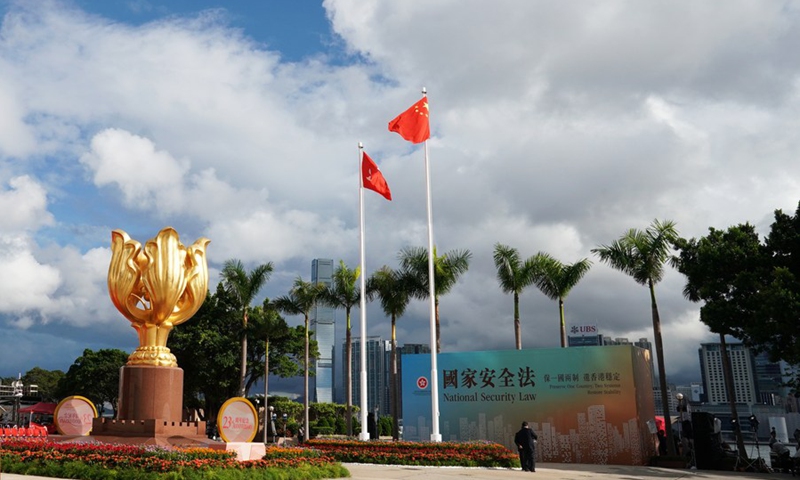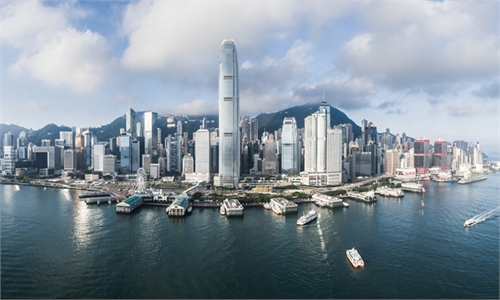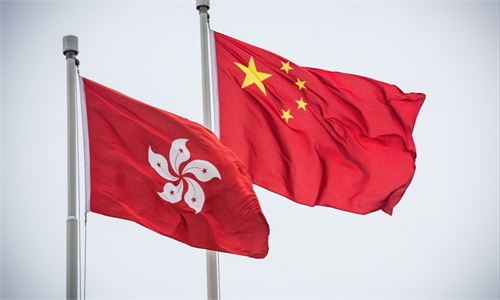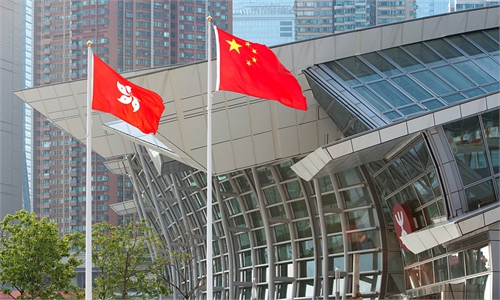Interpretation of 'two systems' by former LegCo chief clarifies some longstanding vague understanding in Hong Kong society

Photo taken on July 1, 2020 shows the Golden Bauhinia Square after a flag-raising ceremony held by the government of the Hong Kong Special Administrative Region in Hong Kong, South China. Photo: Xinhua
The "two systems" in the policy baseline for Hong Kong - that of "one country, two systems" - refer to the economic systems, instead of the political system, the first president of the Legislative Council (LegCo) of the Hong Kong Special Administrative Region (HKSAR) after the city returned to the motherland was quoted as saying in a recent media report, which was considered an interpretation, helping clarifying a vague and longstanding understanding about "two systems" in Hong Kong society.
What Rita Fan Hsu Lai-tai, former president of LegCo, wanted to emphasize in her interpretation of the "two systems" is that the electoral reform in Hong Kong is not about changing the political system in Hong Kong. What the central government has promised in terms of the capitalist system and lifestyle that Hong Kong has been maintaining remains unchanged, observers said.
Rita Fan Hsu Lai-tai, former president of LegCo, told Shenzhen TV that the actual situation has proved that the current electoral system in Hong Kong does not work out anymore, which has pushed the city onto "the edge of the cliff," making the prosperity and stability of the city vanish, she said.
When it comes to "one country, two systems," the two systems indicate that Hong Kong's economic system is different from that of the Chinese mainland, or the system of financial opening-up, the former LegCo president said. To change the political system, it should be approved by the National People's Congress Standing Committee, she said.
When looking back in history, what Hong Kong clearly demanded during the negotiation between the Chinese central government and the UK was two things. One was that the lifestyle remained unchanged and the other was an unchanged economic system, in other words, capitalism with a high degree of autonomy on economic activities or trade deals with other countries. But there was no single word saying that Hong Kong could turn into "an accessory" of the US and that anything related to the US is correct, Fan said.
"Democracy is respecting different opinions, which is not about 'lam chau,'" she added.
"Lam chau," which roughly means "self-destruct together," has become a commonly used slogan among anti-government groups in Hong Kong to pursue their radical political goals.
Fan's interpretation of the "two systems" under the baseline policy for Hong Kong sparked online discussion, with some legal experts calling for reference to the definition stipulated by the Basic Law.
Article 5 of the Basic Law stipulates that "the socialist system and policies shall not be practiced in the Hong Kong Special Administrative Region, and the previous capitalist system and way of life shall remain unchanged for 50 years."
A senior expert from Hong Kong close to the matter of the upcoming electoral reform and who preferred not to be identified said Fan's remarks could not be interpreted out of context, and "what she wanted to emphasize is that the power to overhaul the political system of Hong Kong is in the hands of the central government," he said.
Some observers and legal experts agree with Fan, saying that she was delivering a message that the political system of Hong Kong is under the jurisdiction of the central government, and what she wanted to emphasize is that Hong Kong needs to maintain the capitalist system by further opening up its market. But when it comes to political reform, it's the matter related to China's top legislature.
What Fan emphasized in the interview involved the electoral system, which usually serves the economic interests, according to some observers. The electoral system established in Hong Kong over the past years has been proven to be a failed system, as it failed to serve the interests of Hong Kong economy and its livelihood, which has to be changed. Some deliberately interpreted the changes to the electoral system as complete overhaul of the system as mentioned in the "two systems" of the Basic Law, and that is putting her interpretation out of context, observers said.
Only a democratic system that ensures Hong Kong's prosperity and development would be suitable for Hong Kong, and Fan's interpretation serves as a reminder of this key message, according to some observers.
As far as I'm concerned, the initial intention of implementing "one country, two systems" was to maintain the Hong Kong people's lifestyle and an unchanged capitalist system, which have always existed, Fan said.
She noted that when it comes to the political system, as mentioned in Annex I and II of the Basic Law, it should be reviewed by the NPC Standing Committee, but most people in Hong Kong do not read the Basic Law but listen to some barristers and believe they are right.
Some Chinese netizens agreed with Fan's interpretation at this moment when the central government decided to carry on the electoral reform in Hong Kong. A netizen on Weibo said the most important thing to realize is that Hong Kong is not a political entity, and the political system is a matter of a county, not the matter of a city. "So the 'two systems' means Hong Kong should maintain the original system in managing its economic and social affairs."




